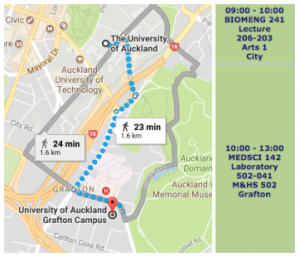As I have clearly shown from my previous posts, I absolutely love BME and I don’t think there is any other degree that I would rather be studying for, but it isn’t for everyone and there are definitely some things to consider before choosing BME.
So today, I’m going to outline some of the downsides. It’s often really easy to hear a very one-sided opinion of a programme/degree/specialisation because you’re usually hearing about it from someone who loves it, but they all have their downsides and some of these may vary from person to person.
From my own experiences and from speaking to my classmates, I’ve compiled a list of 10 things to think about if you are considering BME! Take all of these with a grain of salt – what I am trying to say in a reasonably small number of words represents many different backgrounds, opinions and experiences, so think of them more as prompts for things you might want to talk about someone with if you are considering BME.
One last note: A common thread between many of these points is that the BME industry as a whole is not explicitly related to choosing BME as a specialisation – what I mean by this is that you can do a variety of specialisations (mechanical, electrical, mechatronics, software for example) that result in you working in the biomedical engineering industry in the future, so my points below relate to the degree rather than the industry.
So here goes: 10 Reasons you shouldn’t do BME
- The job market for biomedical engineering graduates is not huge
There are many sides to this discussion, but in a season of looking for summer work experience and graduate positions, BMEs have to do a lot more looking than say, our civil counterparts. Even though the industry itself is big and growing quickly, many engineers employed into this industry have more traditional mechanical, electrical and software backgrounds.
- There’s quite a lot of maths and coding within the degree
As a spinout from the Engineering Science degree, the Biomedical Engineering degree at UoA does have a large emphasis on mathematical modelling and computation. While design and mechanical aspects are also covered, if you really dislike coding then this might not be the specialisation for you.
- Those BIOSCI/MEDSCI papers…..
Some of us love them and some of us do not. While these papers only make up 1/8 of the degree, that may seem like a very large fraction if you really dislike studying for biology. Some career paths within the BME industry may not require huge biological knowledge while others may only require a “learn just in time, not just in case” approach.
- Specialising within BME
Think BME sounds like a very specialised degree? Not quite. What area of BME are you interested in? Product design? Computational modelling? Medical Devices? Biomaterials? Pharmaceutical Engineering? Healthcare systems? Systems Biology? Even if BME has lots of appeal, what kind of work do you want to be doing in the future? (Side note: If you do chose BME, you don’t have to be thinking about this in first year as the first two years have highly prescribed timetables, but still something to be aware of when making your specialisation decision)

- There’s no escaping the content you didn’t like in first year
As I have previously mentioned, BME is surprisingly broad in terms of the aspects covered.
If there are any parts of first year you would give a left kidney to never have to do again, chances are you might encounter it again in BME. ENGSCI111 makes an appearance in a good third of the second year BME papers. You can find ENGGEN121 and CHEMMAT121 fundamentals in BIOMENG221. ENGSCI233 is a continuation of ELECTENG101 and ENGGEN131. Design pops up again in ENGGEN204 and BIOMENG241. And I think it’s a given that there is some biology involved – ENGGEN140 has been pretty helpful.
- Walking up and down to 70 and to Grafton
Prompted by a friend because I don’t mind the fresh air… as long as the weather is nice.
- The small cohort
I’m hesitant to say this is a downside but I guess if you don’t like the sound of being in a small class. Another consequential downside of this is only have one stream, so you get pretty little say in your timetable, but probably a pretty insignificant when choosing what you want to be studying for the next four years.
- You want an easy degree
You’re probably doing the wrong degree as a whole if you’re wanting to pick something that is easy, but BME definitely is not renowned for being light on the workload.
- Having your engineering authenticity questioned
Probably a low point in the year was someone asking me if I was studying “real” engineering. Definitely a low blow to the self esteem, try and avoid this situation.
- You don’t want to learn lots of interesting things, make good friends, challenge yourself, be in the best engineering department..
🙂
Just to reiterate, these are just some prompts for things you may want to ask about if you’re considering BME, and are generally based off of things that my classmates and myself did not know about BME throughout first year. Feel free to get in contact with me if you have any questions!
Till next time, Mairi 🙂


